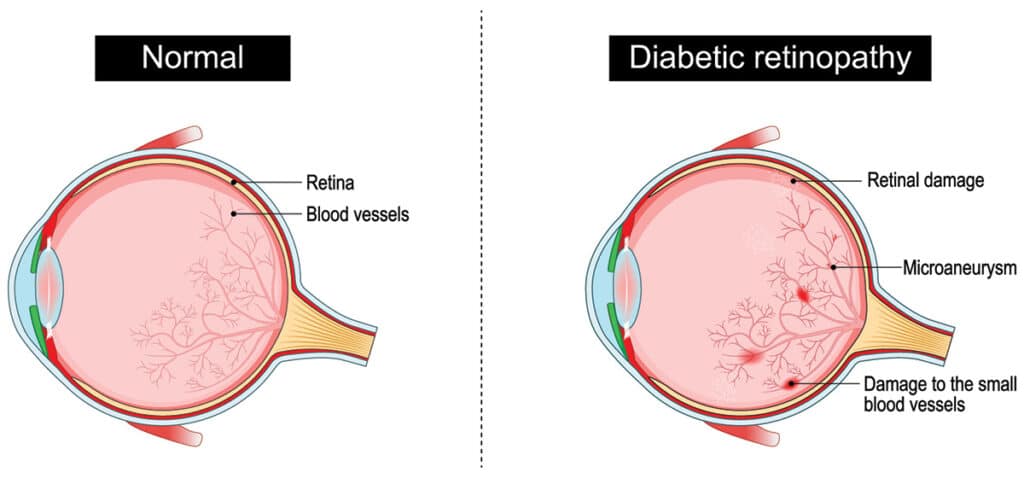What is Diabetic Retinopathy?
Diabetic retinopathy is a complication of diabetes that affects the blood vessels in the retina, the light-sensitive tissue at the back of the eye. Over time, high blood sugar levels can damage these blood vessels, leading to vision problems and, if untreated, vision loss. Diabetic retinopathy is one of the leading causes of blindness in adults, but early detection and treatment can significantly reduce the risk of serious complications.
Diabetic retinopathy occurs in two main stages:
Non-Proliferative Diabetic Retinopathy (NPDR)
The early stage, where damaged blood vessels may leak fluid or blood, causing swelling in the retina.
Proliferative Diabetic Retinopathy (PDR)
The advanced stage, where abnormal blood vessels grow on the retina, leading to scar tissue, bleeding, and an increased risk of retinal detachment.
A common complication of diabetic retinopathy is diabetic macular edema (DME), where fluid leaks into the macula, causing swelling and blurred vision. DME can occur at any stage of diabetic retinopathy and is a leading cause of vision loss in people with diabetes.
Symptoms of Diabetic Retinopathy and Macular Edema
In its early stages, diabetic retinopathy may not cause noticeable symptoms, but as the condition progresses, you may experience:
- Blurred or fluctuating vision.
- Dark or empty areas in your vision.
- Poor night vision.
- Colors appearing faded or washed out.
- Vision loss in severe cases.
If you have diabetes, regular eye exams are critical for detecting diabetic retinopathy and macular edema early, even if you don’t notice any symptoms.
How Are Diabetic Retinopathy and Macular Edema Treated?
At Retina Center of Chicago, we offer comprehensive care for all stages of diabetic retinopathy and diabetic macular edema, using the latest treatments and technologies to protect your vision:
Laser Treatment
Laser photocoagulation can seal leaking blood vessels and prevent the growth of new abnormal vessels.
Intravitreal Injections
Medications such as anti-VEGF drugs or steroids are injected into the eye to reduce swelling, prevent abnormal vessel growth, and preserve vision.
Vitrectomy Surgery
In advanced cases, vitrectomy surgery may be necessary to remove blood, scar tissue, or address retinal detachment.
Our team works closely with patients to develop personalized treatment plans based on the severity of their condition and overall health.
Why Choose Retina Center of Chicago for Your Care?
At Retina Center of Chicago, we specialize in the diagnosis and treatment of diabetic retinopathy and diabetic macular edema, offering state-of-the-art care tailored to each patient’s needs. We are committed to helping patients with diabetes maintain their vision and quality of life through expert care, ongoing monitoring, and education about managing their condition. Whether you need preventive care or advanced treatment, our team is here to support you every step of the way.


